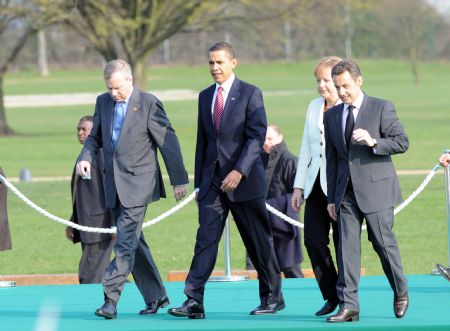 |
|
(L-R) NATO Secretary General Jaap de Hoop Scheffer, U.S. President Barack Obama, German Chancellor Angela Merkel and French President Nicolas Sarkozy reach France after crossing German-French border bridge, Passerelle Bridge, which connected German city Kehl and French city Strasbourg, on April 4, 2009. Leaders of NATO member states held a symbolic ceremony on the French-German border on Saturday to celebrate the 60th anniversary of the military alliance and the return of France as a full member. [Wu Wei/Xinhua] |
NATO leaders on Saturday launched a process to review its Strategic Concept, a document that guides all its activities, in order to stay relevant in a changing security environment.
The leaders want the NATO secretary general to convene a group of experts to prepare the review so that a new Strategic Concept is ready for approval at their next summit.
NATO stayed rather stable in the first 50 years of its history, but began to see changes after the end of the Cold War in the 1990s. Changes are taking place even faster since the 9/11 terrorist attacks in 2001.
After the demise of the Warsaw Pact organization in 1991, NATO lost its potential enemy and at the same time its raison d'etre. NATO then had to find new reasons for its continued existence -- that is exactly what it is doing today.
In their Declaration on Alliance Security, which serves as the basis for the review of the Strategic Concept, the NATO leaders lay bare their plans to redefine the alliance's future role and to revamp a string of key policies.
The leaders envisage cyber-attacks, energy security and climate change as new threats to NATO, which would mean big changes in NATO's future operations.
The leaders stress the importance of fair burden sharing among allies, a thorny issue that has baffled the alliance for a long time. The currently cost-lies-where-it-falls principle is discouraging allies' contribution to NATO's operations, such as Afghanistan. The leaders also want a reform of NATO's structures to make them leaner and more effective. But the reforms are expected to be a long and painful process.
With the enlargement of the alliance, decision making, which is based on consensus, has become increasingly less efficient. Different priorities of the allies are making consensus even more difficult.
Externally, NATO has to address a number of relationships, with the European Union (EU), with Russia, with other partners and with international organizations.
In their Alliance Security Declaration, the leaders stress the importance of strategic cooperation between NATO and the European Union (EU). "We are determined to ensure that the NATO-EU relationship is a truly functioning strategic partnership," reads the document.
The leaders support more robust defense capabilities of the EU, but warn against the danger of competition between the EU and NATO. "Our efforts should be mutually reinforcing and complementary."
In future, the two bodies need to have a division of labor with the EU focusing itself primarily on Africa while NATO going global, said Kees Homan, a researcher at the Dutch Clingendael research institute.
NATO also has to get its relations with Russia right as the relationship plays a crucial role in transatlantic security. NATO leaders have become less confrontational in their declaration, underlining the importance of cooperation with Russia in face of common challenges. But the NATO-Russia relationship remains fragile as the two sides have fundamental differences on various issues, such as Georgia, Kosovo, NATO's enlargement and missile defense.
NATO's biggest challenge, of course, is Afghanistan. NATO, again, is changing its strategy as it has realized that a military solution is not possible.
At the summit, the leaders endorsed a new strategy unveiled by U.S. President Barack Obama a week ago and pledged to commit more resources. But Europe is not generous in offering troops.
Under the U.S. strategy, the Pentagon will send in 17,000 extra troops to Afghanistan, another 4,000 to help train the Afghan National Army, and more civilian personnel to deal with narcotics. Europe is expected to shoulder more responsibility in civilian fields, such as police training and rule-of-law assistance.
But NATO has yet to overcome the differences in interests both across the Atlantic and among European allies. Afghanistan is described as NATO's litmus test for its transformation. Success is not guaranteed.
(Xinhua News Agency April 5, 2009)